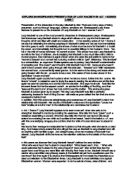Rio Poulton
Explore Shakespeare’s presentation of Lady Macbeth and the witches. How might the presentation of female characters in ‘Macbeth’ appeal to an Elizabethan audience?
Macbeth is a tragic play written by Shakespeare to entertain King James. As the play is a tragedy the play must have a down fall. There are different themes which are shown through-out the play such as murder, ambition and events that involve supernatural. Supernatural in presented in the play, because in 1606 when it was preformed people of those days believed in a lot of supernatural, witches and ghosts. These themes play a big part in the play. The play involved king James’ ancestors but King James didn’t not know this as it is based on a true story but Shakespeare changed all the things about the play that would give it away that it involved King James and his family.
In act 1 Scene 1 Shakespeare begins with the three witches as it brings the theme of supernatural which people where interested in back then and drags the audience in as they now know that anything could happen. Pathetic fallacy is used to create tension at the start of the play. The thunder and lightening which connects to the witches and this is the sort of pathetic fallacy that you would expect to see if anything like witches are involved as witches are known to be evil and nasty and this means that the weather links with them and the way they are mysterious and dangerous just like the weather. At the start of the play the three witches are discussing where they should meet again. ‘In thunder, lightening, or in rain?’ because of the sort of weather conditions there are, for them to meet again, it is not the best weather so the weather related to the mood that will be happening when the do met again. This shows the audience what sort of characters they are, showing them they could potentially cause trouble. King James would have reacted to this opening positively as he very much liked witch craft and supernatural things, so this would have interested him straight away.

This is a preview of the whole essay
Peer Reviews
Here's what a star student thought of this essay
Quality of writing
This essay is structured well, with a chronological development. An area of improvement would be consistency: sometimes they refer to positions in the play as "Act 1 Scene 3" and then "act 2 ii" or "act 1 scene Vii". A common marking area for GCSE is the ability to write a quality essay, and inconsistencies such as these don't give the message that the essay is strong. It would be useful to note that varying the first sentence of each paragraph would contribute to this area. This essay starts a paragraph with a reference to the scene too often.
Level of analysis
This essay analyses quotes well, embedding them when appropriate. The style is sometimes a bit colloquial: "back in those days" but shouldn't detract from the sound use of technical terms throughout. It would've been nice to see some appreciation that Macbeth is a play - this is a common downfall of many GCSE essays, and can be easy way to access higher marks. To build upon the analysis, the question needs to be directly answered. Unfortunately, that last step is missed throughout this essay - an Elizabethan audience, or the extent to which women are presented as appealing is not answered whatsoever. This is quite obvious through the lack of a conclusion.
Response to question
The introduction and lack of conclusion in this essay are areas to look at. The introduction offers nothing to the task, bolting on irrelevant context, not even mentioning Elizabethan audiences or women in the play. Yes, this essay does comment on the audience response, but it is key to mention how contemporary audiences may differ. This can be easily achieved by making a link between the fear of supernatural, and its presentation through the women in the play - an Elizabethan audience wouldn't have seen the appeal. It is okay to disagree with the question, and often it is easier to write a higher-level answer in doing so.







